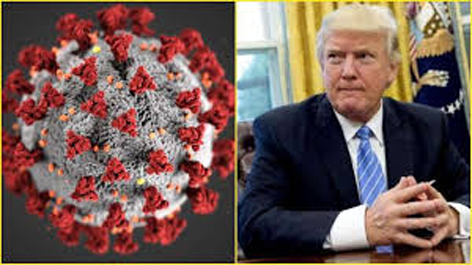
Under Trump, American Exceptionalism Means Poverty, Misery and Death
(May 10, 2020) — No other advanced nation denies healthcare and work protections, or loosens lockdown while fatalities mount.
No other nation has endured as much death from Covid-19 nor nearly as a high a death rate as has the United States.
With 4.25% of the world population, America has the tragic distinction of accounting for about 30% of pandemic deaths so far.
And it is the only advanced nation where the death rate is still climbing. Three thousand deaths per day are anticipated by 1 June.
No other nation has loosened lockdowns and other social-distancing measures while deaths are increasing, as the US is now doing.
No other advanced nation was as unprepared for the pandemic as was the US.
We now know Donald Trump and his administration were told by public health experts in mid-January that immediate action was required to stop the spread of Covid-19. But according to Dr Anthony Fauci, “there was a lot of pushback”. Trump didn’t act until 16 March.
Epidemiologists estimate 90% of the deaths in the US from the first wave of Covid-19 might have been prevented had social distancing policies been put into effect two weeks earlier, on 2 March.
No nation other than the US has left it to subordinate units of government — states and cities — to buy ventilators and personal protective equipment. In no other nation have such sub-governments been forced to bid against each another.
In no other nation have experts in public health and emergency preparedness been pushed aside and replaced by political cronies like Trump’s son-in-law, Jared Kushner, who in turn has been advised by Trump donors and Fox News celebrities.
In no other advanced nation has Covid-19 forced so many average citizens into poverty so quickly. The Urban Institute reports that more than 30% of American adults have had to reduce their spending on food.
Elsewhere around the world, governments are providing generous income support. Not in the US.
At best, Americans have received one-time checks for $1,200, about a week’s worth of rent, groceries and utilities. Few are collecting unemployment benefits because unemployment offices are overwhelmed with claims.
Congress’s “payroll protection program” has been a mess. Because funds have been distributed through financial institutions, banks have raked off money for themselves and rewarded their favored customers. Of the $350bn originally intended for small businesses, $243.4m has gone to large, publicly held companies.
Meanwhile, the treasury and the Fed are bailing out big corporations from the debts they accumulated in recent years to buy back their shares of stock.
Why is America so different from other advanced nations facing the same coronavirus threat? Why has everything gone so tragically wrong?
Some of it is due to Trump and his hapless and corrupt collection of grifters, buffoons, sycophants, lobbyists and relatives.
But there are also deeper roots.
The coronavirus has been especially potent in the US because America is the only industrialized nation lacking universal healthcare. Many families have been reluctant to see doctors or check into emergency rooms for fear of racking up large bills.
America is also the only one of 22 advanced nations failing to give all workers some form of paid sick leave. As a result, many American workers have remained on the job when they should have been home.
Adding to this is the skimpiness of unemployment benefits in America — providing less support in the first year of unemployment than those in any other advanced country.
American workplaces are also more dangerous. Even before Covid-19 ripped through meatpackers and warehouses, fatality rates were higher among American workers than European.
Even before the pandemic robbed Americans of their jobs and incomes, average wage growth in the US had lagged behind average wage growth in most other advanced countries. Since 1980, American workers’ share of total national income has declined more than in any other rich nation.
In other nations, unions have long pushed for safer working conditions and higher wages. But American workers are far less unionized than workers in other advanced economies. Only 6.4% of private-sector workers in America belong to a union, compared with more than 26% in Canada, 37% in Italy, 67% in Sweden, and 25% in Britain.
So who and what’s to blame for the worst avoidable loss of life in American history?
Partly, Donald Trump’s malfeasance.
But the calamity is also due to America’s longer-term failure to provide its people the basic support they need.
Posted in accordance with Title 17, Section 107, US Code, for noncommercial, educational purposes.

The Times Only Sees the “Other” Autocrats
Gar Smith / Environmentalists Against War
(May 2, 2020) — On April 7, The New York Times ran an odd story with the headline “Autocrats flex muscle against elusive enemy.” The lead sentence read: “When the virus hit, the stongmen hit back as they know best.”
The article profiled four “autocratic” leaders, including Egypt’s Abdel-Fattah el-Sissi, Russia’s Vladimir Putin, Turkey’s Recept Tayyip Erdogan, and Turkmenistan’s Gurbanguly Berdymukhamedov (I’m guessing his friends call him “Gurb,” for short).
The Times faulted each of these leaders for their “strongman” responses to the coronavirus pandemic and offered the following examples:
Egypt’s response: Used social media to show military troops disinfecting the streets of Cairo.
Turkey’s response: President Ergogan sent voicemail messages to everyone over the age of 50 assuring them he had everything under control (and jailing the few reporters who suggested otherwise).
Russia’s response: President Putin donned a protective suit to visit infected patients at a hospital and sent 15 planeloads of medical supplies to Italy. The planes were painted with the message: “From Russia with Love.” (If this is what “autocracy” looks like, give me more!)
Turkmenistan’s response: President-for-life Berdymukhamedov simply touted his book on medicinal plants “as a possible solution to the pandemic.”
Oddly, The Times totally ignored three of the world’s most celebrated autocrats: Brazil’s Jair Bolsonaro, The Philippines’ Rodrigo Duterte, and our own Donald Trump.
Bolsonaro denied the pandemic threat—even as the death count soared—and criticized government officials who called for social isolation to contain the virus. Bolsonaro even suggested that Brazilians were naturally immune to the virus because, according to Bolsonaro, they can swim in raw sewage and “don’t catch a thing.”
Duterte has put the nation under a military lockdown and told police that, if they discover anyone ignoring the curfew, they are under orders to “shoot them dead.”
Trump, like Bolsonaro, wasted precious time (and lives) by initially insisting the coronavius threat was a partisan hoax. Like Bolsonaro, Trump has claimed that a malaria drug can stem the pandemic. Unlike Bolsonaro, Trump has money invested in Sonafi, the French company that makes the chloroquine anti-malaria drug that he has repeatedly touted at his daily pandemic press events.
This creates an unparalleled conflict-of-interest. Is it possible that Trump understood that the longer he downplayed the risks and failed to act, the greater the likelihood that he would profit from his investment in a “cure.”
Trump’s readiness to profit off pandemics was clearly on display in mid-March when the German government revealed that Trump had offered “large sums of money” to CureVac, a German company working on a vaccine to halt the spread of COVID-19.
The German government intervened to block the deal, pointing out that Trump had made it clear he wanted the vaccine “for the US only” while Germany’s goal was to provide a vaccine “for the whole world.”
Posted in accordance with Title 17, Section 107, US Code, for noncommercial, educational purposes.